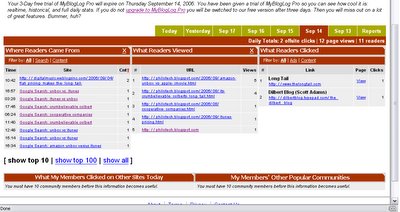 Engadget's The Clicker has a nice essay on DRM today. And judging by the comments, many people feel very strongly about the issue. It's nothing new, but asks the question, "Where do people get their sense of entitlement with regard to content? At the end of the day if that's how content owners choose to sell it, isn't that their right? Isn't ours simply a choice of to buy or not to buy?"
Engadget's The Clicker has a nice essay on DRM today. And judging by the comments, many people feel very strongly about the issue. It's nothing new, but asks the question, "Where do people get their sense of entitlement with regard to content? At the end of the day if that's how content owners choose to sell it, isn't that their right? Isn't ours simply a choice of to buy or not to buy?"
It's a good point - copyright was created for a reason: to allow creators to sell their work. Under U.S. law, it's their choice to sell it, give it away, or Creative Commons-it. As consumers, it's our choice whether or not to buy, and laws of economics will govern their choices.
The laws of economics may or may not apply to digital content in the same way they do for tangible goods, as iTunes has found with their 99-cent pricing scheme. And there are lots of new business models emerging to handle the relatively new scenario where Marginal Costs of Production = 0.
In my opinion, we feel entitled to free access to anything where the MC = 0. As capitalists, many Americans dislike monopolies - which are the only entities that can price products above marginal costs. So by trading pirated content, consumers force the standard laws of economics. This doesn't just apply to content, but software (games, OS, etc.), a bus ride, parking, news, air at the gas station, or whatever other products exist where consumers understand that the marginal cost is essentially zero.
From the comments, however, it seems that most people dislike DRM not because it forces them to pay for music, but because it won't allow them to use it how they'd like. Maybe they're just not admitting they want to steal, but flexibility seems to be most important - so that you can listen to & manage music on any of their devices (which could rack up a lot of fixed costs for the consumer), or watch video content on things other than a computer (Tivo, etc.). Of course, Engadget commenter's are probably not a statistically balanced sample of the population!
Some of my favorite comments so far:
They were raping us with music CD prices and software prices before, now we have them by the balls, theyll still make loads of money, just not as much as before.
They don't know they're paying the same as a CD for a file that may or may not play the next day, or at someone else's house, or on their portable player. But they'll pay anyway, because they don't know, and the seller isn't going to tell them. The buyer is agreeing to terms of which they are unaware of.
You tell me. Did you pay to use the Pirate Bay logo?
The problem is that if I pay for content (music, movie, whatever) I should be able to play it, in my car, house, portable anywhere I want. I should be able to take my movie over to a friends house and watch it or take my music with me to a party and play it. If I get a new portable regardless of who makes the player, it should work it that to. Untill these things are adressed a merry pirate i shall be!
Let's assume that there are no grocery stores or fast food options, the owner of the overpriced gourmet restraunts have made sure of that. Then assume that you are not allowed to share a meal with any of your family or friends. Or maybe you can, but then you have to buy far more food than you really want or need including food that you don't like.
This is more comparable to the situation with digital content today. I would think that in this kind of situation, the moral qualms about not paying the restraunt owners would begin to decrease, significantly. You'd be lucky if people weren't rioting in the streets.
I'm not condoning piracy, but people are tired of the rules that the industry is forcing on them. They're tired of re-buying albums in new formats. They're tired of DRM'd files that won't play where they want them to. They're tired of having the rules dictated to them on how they can do things.
 I wouldn't call it democracy, quite like the Digital Music Weblog does. Apparently, there hasn't been a very good system for creating top-40 lists or top-20 lists for singles, since most music is bought in album form. According to a BBC article,
I wouldn't call it democracy, quite like the Digital Music Weblog does. Apparently, there hasn't been a very good system for creating top-40 lists or top-20 lists for singles, since most music is bought in album form. According to a BBC article,
















